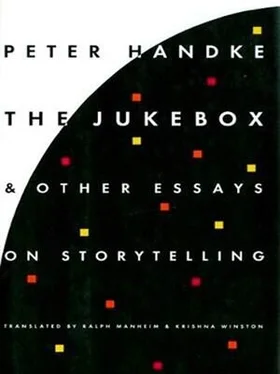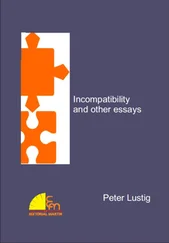In the end he believed he had explored almost every corner of the city (he memorized these rincones as if they were vocabulary words). He entered almost a hundred buildings, for, as he discovered in the course of his conscientious wanderings, little Soria had well over a hundred bars, off the beaten track, in alleys between buildings, often without signs, hidden, like so many things in Spanish towns, from casual glances and known only to those who lived there — as if reserved for them alone. Again and again he found on walls, along with the announcements about hunting times and the pictures of toreros, poems by Antonio Machado, also as wall calendars, some with graffiti on them, one even with a swastika, yet, it seemed to him, not for the usual reasons, but because the poems, at least those chosen as wall decorations, had to do with nature. Amazing how in many establishments there were only young people, and how there were even more bars for older people exclusively and explicitly closed to anyone else (with a table in the corner for the old women): to all appearances, a stricter separation than any political one. Most of the retirees in the province spent their “golden” years here in the capital, and when they were not playing cards in their bars, they sat quietly by themselves at a table or fumbled and poked around incessantly, searching for something. Young and old and he, the stranger in the land, in addition: all their wintry hands lay equally pale on the counters, while the glow of the streetlights outside showed up, for example, the scars on a concrete wall left by a falling metal scaffolding that had killed two pedestrians back when he arrived.
Besides his pleasure in the variations in these places that appeared so similar, he also felt particularly driven to find a jukebox in Soria, first probably out of the old compulsion, but later more and more because this would have been the proper time for it: work, winter, the evenings after the long walks in the pouring rain. Once, already far out along the carretera to Valladolid, he heard from a bar along the highway a deep sound that then turned out to belong to a pinball machine decorated like a chamber of horrors; in a gas-station bar he saw the sign WURLITZER — on a cigarette machine; in a building being torn down in the casco, the center of Soria, surrounded by craters of rubble, he caught sight, in the Andalusian-style tiled bar there, of the selection chart from an ancient Marconi apparatus, a forerunner of the jukebox, used as wall decoration. The only time he laid eyes on his object in Soria was in the Rex movie theater, in an English film set in the early sixties: there it stood, in a back room, waiting for the moment when the hero went by on his way to the men’s room. The only living jukebox in Spain, so to speak, remained for him the one from Linares, in Andalusia. At that time, too, in the spring, he had needed it: work, the commotion of Easter Week. That jukebox, which he had come upon only shortly before leaving, the search long since abandoned, greeted him in a cellar off a side street. A place the size of a storeroom, no windows, only the door. Open at irregular times, and, when open, only in the evening, but then the sign was often not lit — you had to try the door to see if anything was going on there. The proprietor, an old man (turning on the ceiling light only when a guest arrived), usually alone with the jukebox. This one had the unusual feature that all the selection tabs were blank, like nameplates in a high-rise apartment house with all the names missing; like the entire place, it seemed to be out of service; only the alphanumeric codes at the beginning of the blank tabs. But all over the wall, in every direction, up to the ceiling, record covers were tacked, with the proper codes written on them by hand, and thus, after the machine had been switched on, each time only on request, the desired record — the belly of the seemingly disemboweled object turned out to be chock-full of them — could be set in motion. Suddenly there was so much space in that little hovel from the monotonous thumping deep inside the steel, so much peace emanated from that place, in the midst of the hectic Spanish pace and his own. That was on the Calle Cervantes of Linares, with the abandoned movie theater across the street, with remains of a sign reading Estreno, premiere, and bundles of newspapers and rats in the barred lobby, at a time when on the steppes outside the city the hard-headed steppe chamomile was in bloom, and more than thirty years after Manuel Rodriguez, called Manolete, was gored to death by a bull in the arena at Linares. A few steps below the bar, which was called El Escudo, the Escutcheon, was Linares’s Chinese restaurant, sometimes a place of peace for a person from elsewhere, like the jukebox. In Soria, too, he discovered, to his surprise, a seemingly hidden Chinese restaurant; it looked closed, yet the door sprang open, and when he stepped inside, the large paper lanterns were switched on. He remained the only diner that evening. In town he had never seen the Asian family that ate here at the long table in the corner and then disappeared into the kitchen. Only the girl stayed behind and served him in silence. On the walls, pictures of the Great Wall, from which the place took its name. Strange, how when he dipped his porcelain spoon into the bowl with the dark soup, the bright heads of the beansprouts popped up, here in the Castilian highlands, like figures in an animated cartoon, while in the nightly storm outside the window the poplar branches clicked. The young girl, otherwise idle, was painting Chinese letters into a notebook at the next table, one close to the other, in a writing far more even than his own during these weeks (not only the storm gusts, the rain, and the darkness when he took notes outdoors, since he had been at work, had ruined it), and as he kept watching her, who had to feel incomparably more foreign than he did in this area, in this Spain, he sensed with amazement that he had only now really set out from the place he came from.
ESSAY ON THE SUCCESSFUL DAY
A self-portrait by William Hogarth, an eighteenth-century moment, showing a palette divided approximately in the middle by a gently curving line, the so-called Line of Beauty and Grace. And on my desk a flat, rounded stone found on the shore of Lake Constance, dark granite, traversed diagonally by a vein of chalky white, with a subtle, almost playful bend, deviating from the straight line at exactly the right moment and dividing the stone into two halves, while at the same time holding it together. And that trip in a suburban train through the hills to the west of Paris, at the afternoon hour when as a rule the fresh air and clean light of certain early-morning departures are vitiated, when nothing is natural any longer and it seems likely that only the coming of darkness can bring relief from the closeness of the day, then suddenly the tracks swing out in a wide arc, strangely, breathtakingly high above the city, which unexpectedly, along with the crazy reality of its enigmatic structures, opens out into the fluvial plain — there on the heights of Saint-Cloud or Suresnes, with that unforeseen curve, an instant transition changed the course of my day, and my almost abandoned idea of a “successful day” was back again, accompanied by a heartwarming impulse to describe, list, or discuss the elements of such a day and the problems it raises. The Line of Beauty and Grace on Hogarth’s palette seems literally to force its way through the formless masses of paint, seems to cut between them and yet to cast a shadow.
Who has ever experienced a successful day? Most people will say without thinking that they have. But then it will be necessary to ask: Do you mean “successful” or only “happy”? Are you thinking of a successful day or only of a “carefree” one, which admittedly is just as unusual. If a day goes by without confronting you with problems, does that, in your opinion, suffice to make it a successful day? Do you see a distinction between a happy day and a successful one? Is it essentially different to speak of some successful day in the past, with the help of memory, and right now after the day, which no intervening time has transfigured, to say not that a day has been “dealt with” or “got out of the way,” but that it has been “successful”? To your mind, is a successful day basically dif ferent from a carefree or happy day, from a full or busy day, a day struggled through, or a day transfigured by the distant past — one particular suffices, and a whole day rises up in glory — perhaps even some Great Day for Science, your country, our people, the peoples of the earth, mankind? (And that reminds me: Look — look up — the outline of that bird up there in the tree; translated literally, the Greek verb for “read,” used in the Pauline epistles, would signify a “looking up,” even a “perceiving upward” or “recognizing upward,” a verb without special imperative form, but in itself a summons, an appeal; and then those hummingbirds in the jungles of South America, which in leaving their sheltering tree imitate the wavering of a falling leaf to mislead the hawk …) — Yes, to me a successful day is not the same as any other; it means more. A successful day is more. It is more than a “successful remark,” more than a “successful chess move” (or even a whole successful game), more than a “successful first winter ascent,” than a “successful flight,” a “successful operation,” a “successful relationship,” or any “successful piece of business”; it is independent of a successful brushstroke or sentence, nor should it be confused with some “poem, which after a lifetime of waiting achieved success in a single hour.” The successful day is incomparable. It is unique.
Читать дальше












